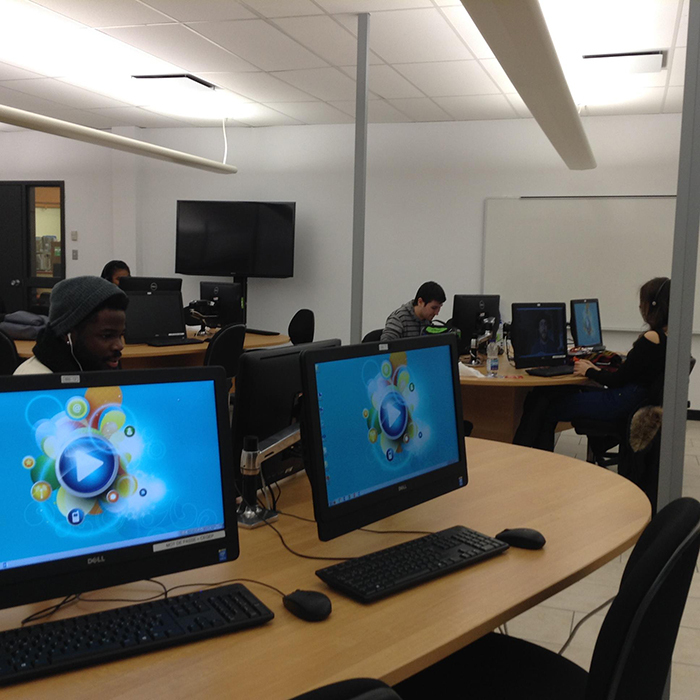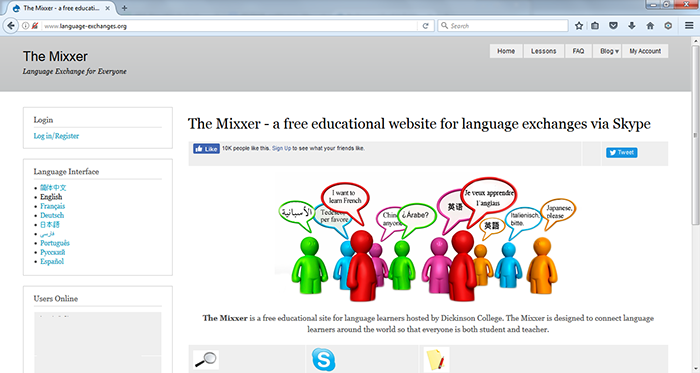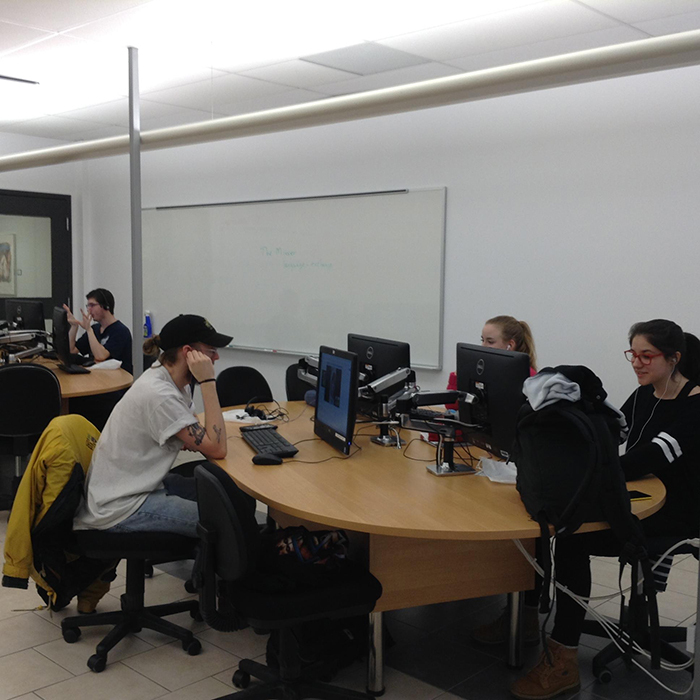Virtual Language Exchanges: Making Connections with Mixxer
For the past few years I have been experimenting with online collaboration with other teachers in the college network as part of my English as a Second Language courses. Last year, we were fortunate to have obtained a grant from the Entente Québec-Canada that permitted myself and some colleagues to familiarize ourselves with synchronous and asynchronous communication pedagogy, which became the subject of a Real Life Story on Profweb. Although I learned a lot through this experience, I felt that we could still make some gains in the efficiency of my use of our active learning lab and that we had yet to exploit all the possibilities these labs and Google tools could offer to both teachers and learners.
The Cégep de Jonquiere has a fully-equipped active learning lab and the technicians and support staff have an excellent collaborative work ethic. In order to increase my comfort using the active learning lab and all of the possibilities it offers, I requested the reservation of the lab for 2 of my English as a Second Language groups (103 level). While I had planned to collaborate with some colleagues in the network this semester, our plans unfortunately fell through, which meant I had to go to Plan B.

The active learning lab at the Cégep de Jonquière.
During a general discussion about languages with my students, I learned that several of the students this semester are very interested in learning different languages; and that some already speak some other languages at various levels of proficiency. In addition to French and English, I also speak some German, and the discussion with my students made me think of how I met my own linguistic partners to practice speaking German. Although I had not visited the site in ages, I returned to The Mixxer – a free educational website for language exchanges via Skype – in order to explore the possibility of using this resource with my classes.

The home page of the Mixxer language exchange website.
The Mixxer website is a database of registered users interested in practicing a language who are also willing to use their native language skills to help teach others. Users can sign up for an account on this site which is maintained by Dickinson College. When you register on the Mixxer website, you create a profile that specifies which language you would like to practice while also specifying which languages you are willing to help others with. Initially, registered users can communicate through the site’s email system to establish first contact in order to avoid using personal email accounts. When you are confident and comfortable with your language partner, you may decide to set up meetings directly on Skype, or any other application chosen by both parties.
Partners decide on how and when they will communicate with each other. I was pleased to learn that the Mixxer encourages the creation of accounts for teachers and immediately contacted Todd Bryant, the website administrator, who provided me with advice and walked me through the process of creating a language exchange event.
Preparing for the Virtual Language Exchange
I created 2 separate language exchange events for my course, imposing a limit of 20 participants as I had 15 students in each of my classes. I had planned for a few contingencies, such as what we would do if we exceeded this limit (pairing up students), if we encountered potential technical issues (having technicians close by) or if some participants were simply unable to attend the event.
The topic of discussion, time and procedure for registering and participating were announced in the initial event. For the first half hour we would practice English, and my students would help the remote participants with their French in the last half hour. The event announcements were sent out to 3 500 registered members of the site. Within 36 hours both my events had been filled.
An example announcement
Once the users had registered for the event, I sent a thank-you note to each of these registered participants indicating my Skype ID (user name), asking them to use The Mixxer’s email system to send me the time zone where they were located as well as their Skype ID. I also asked them to forward a contact request to my Skype ID within Skype prior to the event so that they would be in my contact list (I created groups in my Skype account to keep track of who was to participate, and when.)

Students engaged in virtual language exchanges in a language lab at the Cégep de Jonquière.
On the day of the first event, participants were asked to sign in to Skype at least 15 minutes before the posted event time so that I could pair them with my students on a first-come/first-serve basis. The participants who communicated with us were from:
- Canada
- Costa Rica
- France
- India
- Mali
- Nigeria
- The United Kingdom
- The United States (including Hawaii)
Understandably, students were both excited and terrified to speak to a stranger in their second language. Ultimately, they all loved having the chance to practice their second language while also using their mother tongue to help others that were in the process of learning this language.
The following is the perspective of a Journalism student who was also new to using Skype:
This experience was incredible! I had such a wonderful time doing this activity, and I can’t wait to do it again. I had the pleasure of speaking to a retired British journalist named Jen. We talked about plenty of different subjects during our one-hour-long conversation, from the learning of foreign languages to our experiences with journalism as well as very random things (the status of the Canadian dollar, Brexit, the essentials of journalism, television shows, our various hobbies, etc.). There was never a dull moment. We talked in French a little bit, but I understood that it would be better for our conversation to move forward in English. For the most part, I was just amazed at the functioning of Skype. Jen really appreciated my enthusiasm the whole way through. I can’t wait to use Skype with friends of mine.
Several students have taken the initiative to sign up for an account on The Mixxer in order to practice other languages. An unexpected bonus for me was that this experience has allowed me to make contact with 5 other teachers in Canada and the US who wanted to plan further collaborative activities between our classes.
Pursuing the Collaboration
Based on my positive experience partnering through Mixxer, I will certainly be using this means of pairing up in the future. The feedback from my students was that they preferred the Mixxer meetings to in-class pairings because they were able to help others learn French while also having the opportunity to improve their English.
This experience will be related as part of an upcoming presentation at the RASCAL’s conference, which is taking place on June 5th and 6th, 2017.

